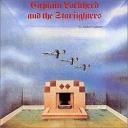Yahoo Answers is shutting down on May 4th, 2021 (Eastern Time) and beginning April 20th, 2021 (Eastern Time) the Yahoo Answers website will be in read-only mode. There will be no changes to other Yahoo properties or services, or your Yahoo account. You can find more information about the Yahoo Answers shutdown and how to download your data on this help page.
Trending News
6 Answers
- ammianusLv 78 years agoFavorite Answer
Only at first.
Holy Roman Emperor Ferdinand II was attempting to enforce Catholicism as the sole religion across lands he controlled,and Protestant powers both within and without the Holy Roman Empire banded together to resist this.Ferdinand was aided by the Spanish Hapsburgs,relatives of his and also Catholics.France,although a Catholic country,aided the Protestant side with subsidies - they believed that if Ferdinand and Spain were successful,France would be surrounded by Haopsburg controlled lands on all its borders.
However,following the destruction of the Swedish army at Nordlingen in 1634,most of the Protestant states in the Holy Roman Empire made peace with Ferdinand,Saxony even allying with him (Peace of Prague 1635).
This forced France to enter the war directly itself,and pay increased subsidies to Sweden to keep them in the war,and some minor Protestant forces (such as the Weimariners) for the same reason.
So,from 1635 the Thirty Years War lost its religious aspect,as the main combatants - France v Spain and the Holy Roman Empire - were now all Catholic,the war thus becoming a dynastic struggle between the Bourbons and the Hapsburgs.
- ALANLv 68 years ago
Religion as a "cover" for political ambition, eventually about nationalpolitical/military supremacy.
The earlier "wars of religion" across the "Holy Roman Empire" had been ended with an agreement "That the Religion of each State shall be that of its Ruler", but when the Catholic King of Bohemia died, the Protestant nobles offered the throne to the Protestant Prince Frederick of the Palatinate (Rhineland), who was also an "Elector" - one of the Princes who elected the Holy Roman Emperor.
He accepted, thereby upsetting the "balance" within the Empire, and defied the Emperor's order to withdraw.
A Catholic Prince, the Duke of Bavaria, then offered to eject him from Bohemia in return for his Electorship, thereby altering the "balance" of the Electors. He did so, and then occupied the Protestant Principality of the Rhineland, further upsetting the "balance of the States and He had th financial backing of Catholic Spain for this - Spain wanted the Rhine to be a Catholic-controlled waterway so that it could send its Army down it to recover its lost Dutch Provinces, its attempts to do so by sea having been disasters.
This aroused alarm among the the Protestant Dutch, and North German Princes, more armies were raised, alarming the Catholic Princes, who did likewise, more conflicts broke out, and the fightind spread right across Central Europe.
These armies were not "national", but "mercenary" ones - full-time professional soldiers under various leaders - Tilley and Wallenstein (Catholic), Mansfeld Protestant) etc. - who fought for pay. They used devastation of towns,villages and crops as a "punishment" when advancing, and as a "delaying tactic" when in retreat, during Winter they settled wherever they were, "lived off the land", and, being entirely undisciplined when not in action,, treating the unfortunate local inhabitants with great brutality. They also spread disease wherever they went.
At first the "Catholics" had the upper hand, but then the Protestant King of Sweden joined in, reversing the situation - until he was killed in battle. The war dragged on, neither side being able to gain final victory. France, though Catholic, became alarmed by the spread of Spanish power and influence, supported the "Protestant" side, and the war became a power-struggle, with France eventually emerging triumphant, and Spain bankrupted and in permanent decline - and every part of Germany except Prussia totally devastated.
(Protestant England came within a hair's-breadth of involvement - Frederick was the son-in-law of King James VI & I - during the Parliamentary Debate of 1621, but that debate became completely diverted by an unwise statement made by the King in a letter to the Commons. Instead, it fired the first "shot" of the English Civil War, 20 years later !)
Source(s): Read "The Thirty Years' War" by C.V.Wedgewood - QUITE fascinating ! - lwhhowLv 78 years ago
Certainly at first......The 'War' (1618-1648) was really 4 wars with brief peace in between the whole period lasting 30 years.
The 1st 2 periods of the war (Bohemian and Danish) (1618-1629) were mostly over religion. But then it became about politics and national power/ nationalism masking as religion for the 3rd/ 4th periods (Swedish and French) (1630-1648).
- Mark MLv 78 years ago
Everything but religion. France, a catholic country, paid for most of the protestant armies. The wars bankrupted spain and the Austrian empire. Making France top dog for the next 100 years.
- How do you think about the answers? You can sign in to vote the answer.
- 8 years ago
Yeah. Mostly about what Christianity is the right Christianity. Protestants killing Catholics and Catholics killing Protestants and Jew being killed regardless just cuz








